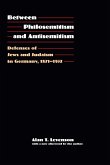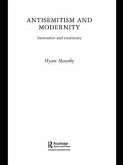In 2010 an extremist party with openly racist views, using barely concealed antisemitic language, received 17% of the votes in the parliamentary elections in Hungary. How can this awkward development in a newly established European democracy be explained? In this book the author examines antisemitism in post-communist Hungary in light of the empirical sociological studies of the past 20 years. The principal aim is to reconstruct the range, intensity and content of anti-Jewish prejudices as well as the factors affecting their change over time. The author also reveals the social background against which the newest political developments should be analyzed, and helps to determine whether in Hungary today antisemitism is only an ephemeral, temporary phenomenon or a gradually articulating, dynamic political ideology.
Hinweis: Dieser Artikel kann nur an eine deutsche Lieferadresse ausgeliefert werden.
Hinweis: Dieser Artikel kann nur an eine deutsche Lieferadresse ausgeliefert werden.








